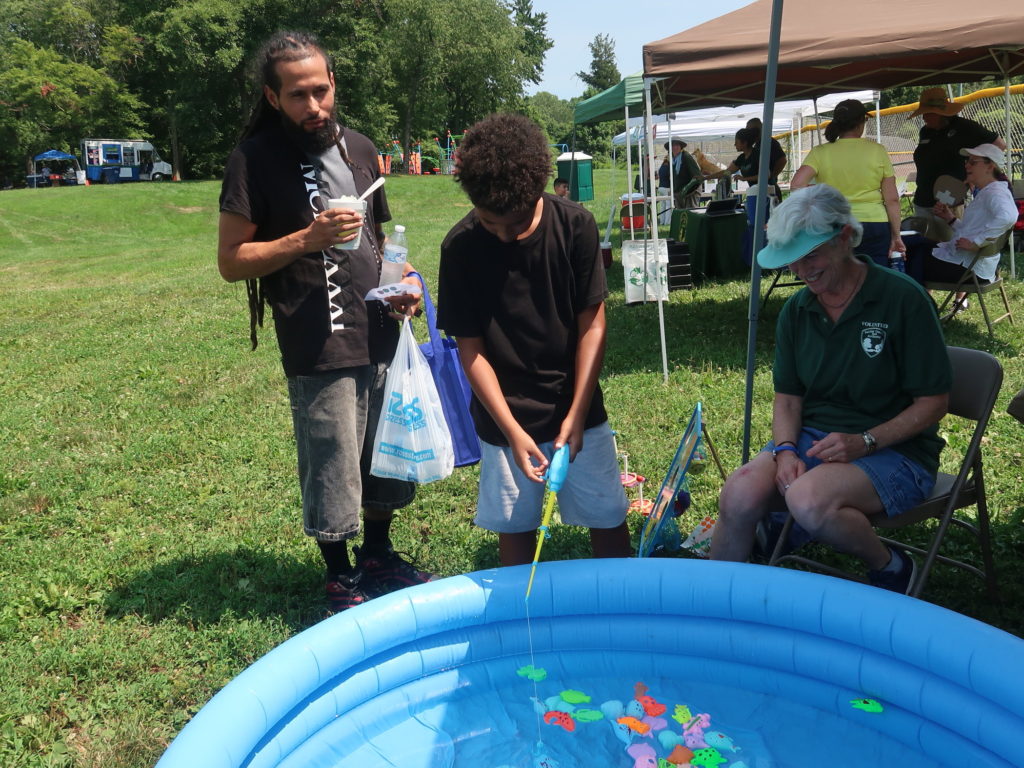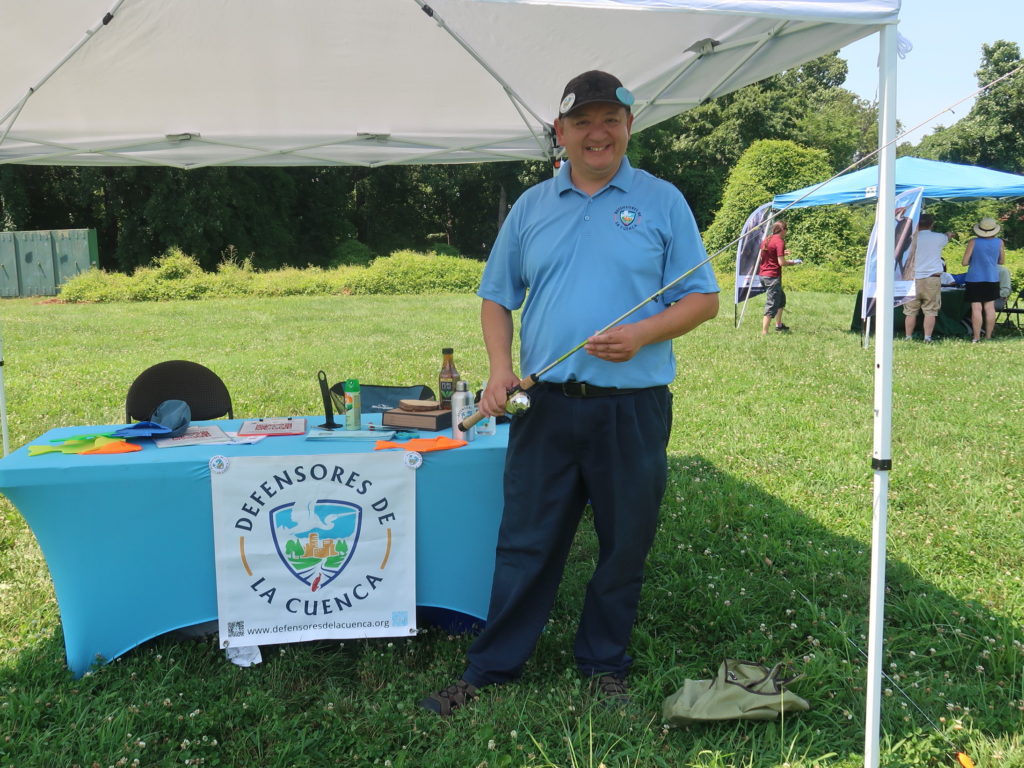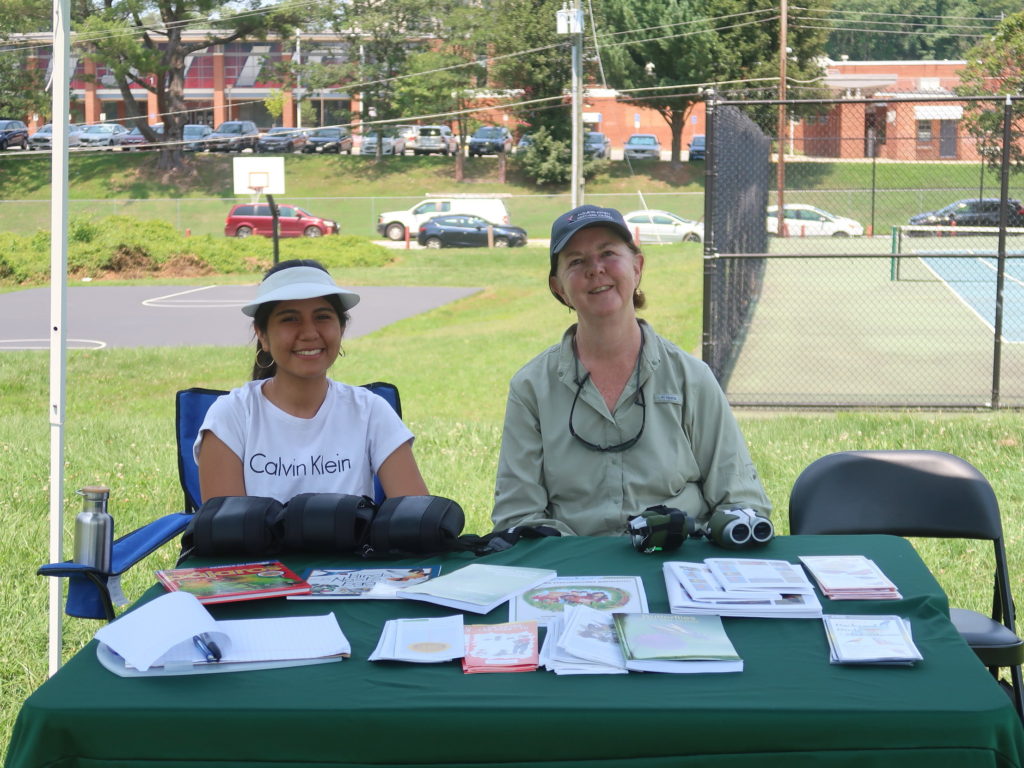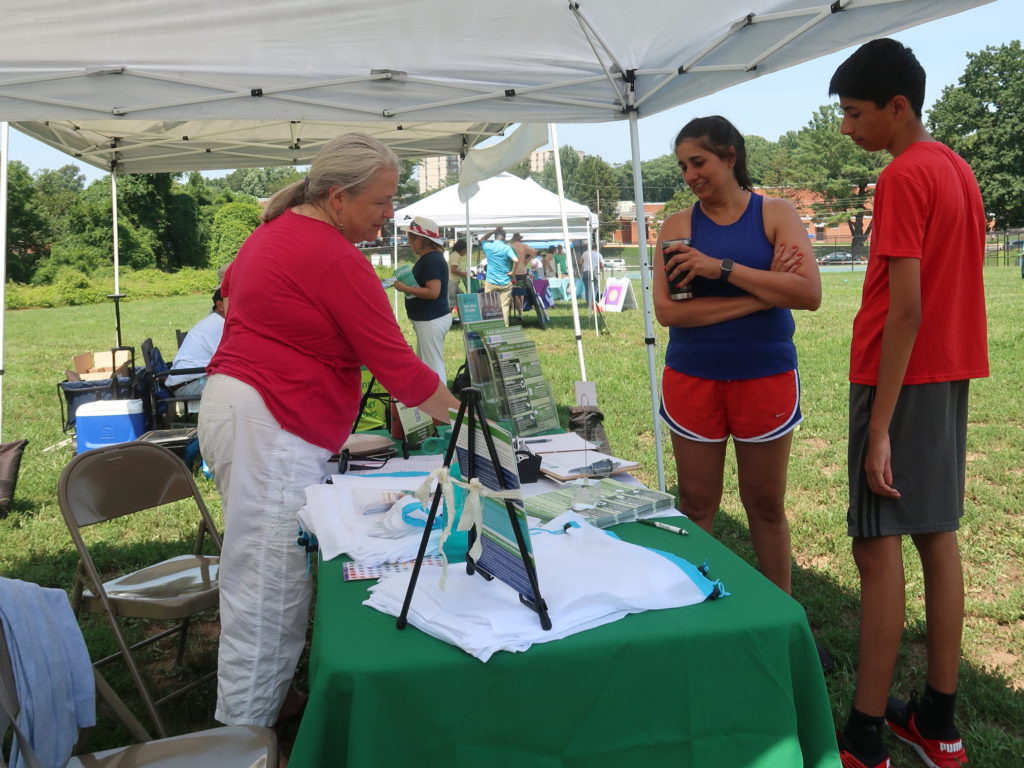Latino Festival focuses on conservation

The extreme heat likely discouraged some people from going to the Latino Conservation Festival at Justice Park on Sunday, but those who braved temperatures in the upper 90s found a wealth of information about nature, outdoor activities, and much more.
The event was the centerpiece of the Fairfax County Park Authority’s celebration of Latino Conservation Week.
During the festival, Joan Haffey, a member of the board of the Audubon Society of Northern Virginia, led bird walks on the Justice Park trail.

An organization called Defensores de la Cuenca, hosted children’s games with an environmental theme. It was founded a couple of years ago to provide information to the Latinx community about parks and natural resources, said community liaison Carlos Lan.
The group educates the community about recycling and composting, Lan said. They also teach children how to fish and take them on fishing trips to the Rappahannock River.

Representatives of Quiet Clean NOVA were at the Latino Conservation Festival to educate the public about the need to stop using gas-powered leaf blowers. “We’re trying to get people to change their mindset and realize how bad they are,” said Kristi Kwon.
The group opposes gas-powered blowers because they are “massive polluters,” disrupt the ecosystem, create deafening noise that degrades the quality of life in neighborhoods, and raise concerns about environmental justice by harming work crews.

Boy Scout Zane Javeri hosted a kids’ game and brought a display about his Eagle Scout project to collect old, unusable tennis balls and ship them to a recycling company.
Staff from the Fairfax County Health Department handed out materials on Covid testing and vaccines and information about summer pests, including a children’s coloring book about ticks.
Related story: Community celebrates newly expanded Hidden Oaks Nature Center
Some of the other agencies and nonprofits at Justice Park included the Faith Alliance for Climate Solutions, the Park Authority’s Invasive Management Volunteer Program, Hidden Oaks Nature Center, Frying Pan Park, and Fairfax County Master Gardeners.

A bunch of white women telling Latinos not to use leaf blowers. I don’t even know where to start.
I have a question. If I use an electric blower, Dominion will power it with 88% fossil fuels, because that’s how they generate electricity. Should I cut down my mature trees?
Haha to that note, a single flight from Dulles to California emits more greenhouse gases than I could prevent by going entirely carbon neutral for the rest of my life.
Don’t get me wrong, I believe that we should all have a more environmentally conscious attitude and we should be doing much more to reuse, reduce, and recycle. However, the idea that individuals, not corporations, should be held responsible for climate change is laughable.
Start by educating yourself about the harmful emissions from gas-powered leaf blowers. These dirty 2-stroke engines have been banned in D.C. since January. The landscaping companies are still thriving there. Electric blowers are emission-free but still stir up high levels of PM. Yes, they largely depend on fossil fuels, but overall have a smaller carbon footprint. Electric blowers are also less noisy. Better solutions than blowing leaves: 1) Using a mulching attachment, mulch the leaves in place. This chops the leaves into tiny pieces so they fall between the blades of grass and virtually disappear. Adding this fine organic matter to the lawn will nourish the grass and help suppress weeds. 2) Use a rake and tarp. This takes longer but is excellent exercise. For info, go to http://quietcleannova.wordpress.com/
1) I know they are emitters, and don’t use mine often. 2) I don’t care what D.C. does, and I certainly don’t consider them a benchmark by any stretch. 3) Electric blowers may work in D.C. with small yards, but not on serious acreage. 4) I spend days and days blowing my leaves onto massive tarps, and I have one of the biggest, most expensive commercial grade backpack blowers you can buy. I’m in shape, know what I’m doing. 5) Chopping up the leaves that I get would produce a thick layer of mulch that would attract rats and kill all my plants and grass. 6) A rake and a tarp and no blower would take me weeks to get up the leaves. I use a huge rake for the “small stuff” – maybe up to waist deep, but not for the equivalent of 3 olympic size swimming pools of leaves.
Hello Jose,
I am curious to know what suggestions you have to reduce emissions, either with the leaf blowers or in other aspects.
@catboy, agree that all the actions to reduce emission cannot come from individuals. It has to be a hand in hand with our own individual actions + the companies and government’s actions.
We, as individuals are part of companies – either as employees there and we can try to influence from inside to do things differently with a sustainability lens, and also through advocacy to show the biggest polluters that we oppose the way they are doing business (hurting the environment and with that our health and wellbeing)
Reducing emissions is near the bottom of my long list of priorities.
The latino community can barely survive and the leaf blowers are part of their survival. I agree that we should focus on the corporations’ carbon footprint. Education is good but lets be realistic with our expectations.
Appreciate the comments, Jose’s especially gave me a chuckle, but I find the demand by some to focus on corporations rather than individuals to be ludicrous.
Whenever I fly, I fly coach, and when I fly coach I see other individuals sitting next to me and throughout the plane, not corporations.
Corporations don’t eat meat and drink milk, individuals do. It will take individuals changing their habits to prevent the climate change apocalypse.
I’m doing my part. I’m raising crickets in my basement and then grounding them up and using the cricket powder in my baked goods and as additives to smoothies and other food items.
I share the food I make with my friends, families, and colleagues whenever I can. Almost uniformly, I receive compliments on how my food tastes.
Whenever I’m asked what ingredients I use I explain that I rely on old secret family recipes handed down to me from my mother and aunts.
Commenters who whine and say responsibility for protecting the Earth’s environment should be laid at the feet of corporations are not serious and are simply passing the buck.
Susie, progressing beyond the progression of progressives, is eating bugs already. There is a Chinese land grant in your future! Readers take note.
Ron, while I’m ahead of the curve, you’re a little behind the curve.
Millions of dollars are being invested right now into the development of a modern building in Canada where billions of crickets will be raised and cultivated every year for the North American market. Google it.
Various brands of cricket protein powder, bars, and flour are available for sale on Amazon, TODAY. Google it.
Again, the typical so-called virtue-signaling Progressive isn’t down for doing what is necessary to prevent the climate change apocalypse. They still want to eat their high-carbon, animals for protein. They want “corporations” to make sacrifices, not “individuals” like themselves.
I don’t believe for a second that the typical Progressive wants to end the use of gas-powered blowers because of their impact on the climate. Instead, the typical Progressive doesn’t want to hear the noise made by the gas-powered blowers when used by their hired help. Stereotypically assumed to be Latino men.
Haha so you have been secretly feeding crickets to your friends and family? Interesting.
My point is that the while the collective will to fight climate change is important, our efforts on an individual scale are absolutely miniscule compared to the wasteful, destructive nature of profit-driven decisions. Even if the entire country switched from gas to electric mowers, the difference in impact would be depressingly small. It does almost absolutely nothing in comparison to the effects of coal power plants or fracking. The best that it does is cut down on noise pollution and perhaps makes myself feel good about what I am doing. Beyond that, it is all a moot point if corporations are unwilling to buy into the same type of behavior. That is, being environmentally conscious even if it reduces maximum profit. Protecting the environment for the sake of the planet and not for the sake of marketing and public relations.
Not saying that our individuals should be given a pass when it comes to environmental consciousness, just that corporations are the ones passing the buck here.
You apparently think you’re being cute and clever by baking those crickets into your food and then failing to disclose that fact when people ask about the recipes. It’s actually deceitful and cocky. You know that at least some of them would object, or else you would tell them all, BEFORE you fed them, yet you call some of those folks your “friends.”
You owe it to every single person who’s eaten your creations the truth. Let them decide for themselves what to eat.
I’ve already given your concerns some thought Kim, and I appreciate you raising them.
In my opinion, when individuals buy food from restaurants, especially stews and other combined dishes, and when individuals buy ultra-processed foods from grocery stores, the vast majority of the individuals do not take the time or effort to ask or research (read the label) what they are eating. Instead, they focus on whether they enjoy what they are eating.
Also, I would not be surprised at all if in the very near future Western governments approve food packaging rules which hide food additives derived from insects under an innocuous name (“other natural ingredients”).
The only concern I do have is that cricket protein tends to cause an allergic reaction in individuals who are allergic to shellfish, so in this respect I have been very careful in doing my small part to save the planet.
After all, simply voting for elected officials who will keep fossil fuels in the ground and by necessity drive up the cost of fossil fuel based energy to hasten the transition to sustainable energy is not sufficient in my view.
Saving the planet requires direct action by all individuals dedicated to the cause. Everything else is virtue signaling in my view.
Leaf blowers are part of Latinos’ survival? Seriously? Because they’re incapable of doing anything else? How about simply buying battery-powered blowers that work just as well as gas-belching monstrosities. If batteries don’t last long enough, buy an extra battery. Too expensive? Well how much does all that gas cost?
But homeowners actually bear most of the responsibility. First, they should stop thinking that “perfect” lawns are a good thing and that they have to remove every single leaf from their .property. Leaves are needed for insect survival, including butterflies and fireflies. Not to mention that they provide important nutrients and protection to the soil.
The environment is being attacked on all fronts, everywhere, and suburban lawns are one area that’s very simple to correct. If more people don’t wake up and start caring about our planet very soon, it will be too late for all of us.
Converting to electric is expensive, and it’s not just the batteries. I had no idea but a commercial grade ride-on electric is 13-20k! This article was pretty illuminating: https://www.lawnsandpalmsfl.com/an-electric-future-for-landscape-and-lawn-care-companies/ Note that they spitball the cost of converting to electric for a small to medium size businesss (two trucks) is nearly $45k. Given the cost of fuel for these companies is somewhere around $5k a year, that’s a payback period of almost a decade. So, I can get the reluctance.
Interesting article. However, in estimating costs with electric lawn care equipment, the author mistakenly assumes that current landscaping practices will remain the same. There is a growing awareness of the environmental negatives of maintaining golf-course style, super-groomed lawns. Maintaining these lawns requires large amounts of water, fertilizer, pesticides, and fossil fuels. Lawns are not a sustainable landscape choice. Moreover, they contribute little to local ecosystems, and have been called “green deserts” and “biological waste lands”. Growing in popularity is the practice of tarping part of one’s lawn for a growing season and then putting in shrubs and beds of native plants. Native plants benefit pollinators and birds, and sales are increasing every year. Thus, reducing mowing areas should help offset the cost of going electric for consumers. And landscapers too, if they can to do yard without stopping to change the battery.
Is lawn care all that “Latinos” can do? No, they also clean toilets, do illegal out-of-code bad jobs on home repair, and a variety of other jobs. The middle-class mostly-white denizens of Fairfax and surrounding counties LOVE having a cheap slave class of illegal immigrants. Could things be done better, for example, greener? Yes. And that would cost money that people are not willing to pay.
As for other jobs that “Latinos” can do, please present your training and employment program, how you want to fund that, its economic impact, and how you would prohibit undocumented illegal fly-by-night businesses from doing things on the cheap.
There are a zillion jobs available right now, from retail to high tech, companies are desperate to fill them.
Bear in mind that you need to create hundreds of thousands of jobs for these folks, that they can do, having walked over here with no skills and just the clothes on their backs and their kids. Put them to work doing something better quickly, because it’s about 2,000,000 people or more each year.
Hi Chris,
I am curious to understand how the portrayed of latinos in your description come from. A statement that says “Latinos” (or replace “Asians”, “Americans”, “Virginians”) “clean toilets, do illegal out-of-code bad jobs on home repair, and a variety of other jobs” assumes that all people under that category act as you described. And I doubt that is true. It may be that you have encounter people that did that, but there is a jump to say that “latinos” in general do that, it takes out the individuality of people.
I am a latina and don’t find myself into any of those descriptions, and I know many other latinos that don’t fit the descriptions either. I have found in my experience that curiosity is a good approach to understand groups that we are not as familiar with. Maybe you want to give it a try
I believe it is fair what you mentioned, sometimes people want a cheap service and there is a market of workers that will do that (which in some cases equals poor quality of a product or service)
I second getting rid of lawns in favor of ground cover, xeriscaping, etc. Lawns are wasteful and polluting. Of course landscape companies would have to pivot from their lucrative lawn care business. Maybe they could lead the way in composting or recycling in neighborhoods, or converting grassy medians to wildflower areas or planting other ground cover or low shrubs. Milkweed is not that attractive but helps Monarch butterflies and could be interspersed with more attractive annuals & perennials. I live in a townhouse and have no grass in my yard but lots of plants that require little or no maintenance year after year. Saves time, money & the environment. No fertilizer or pesticide runoff.